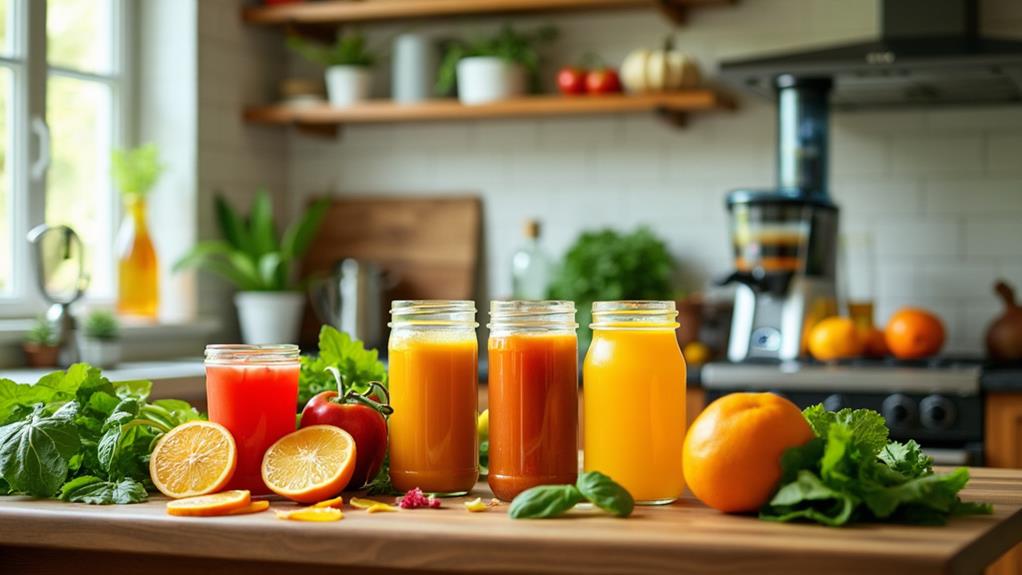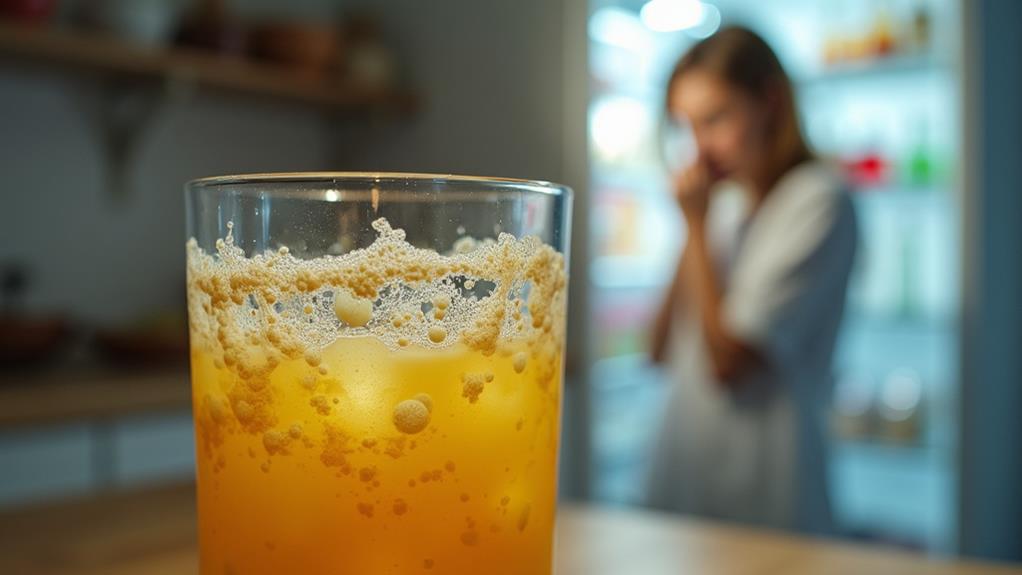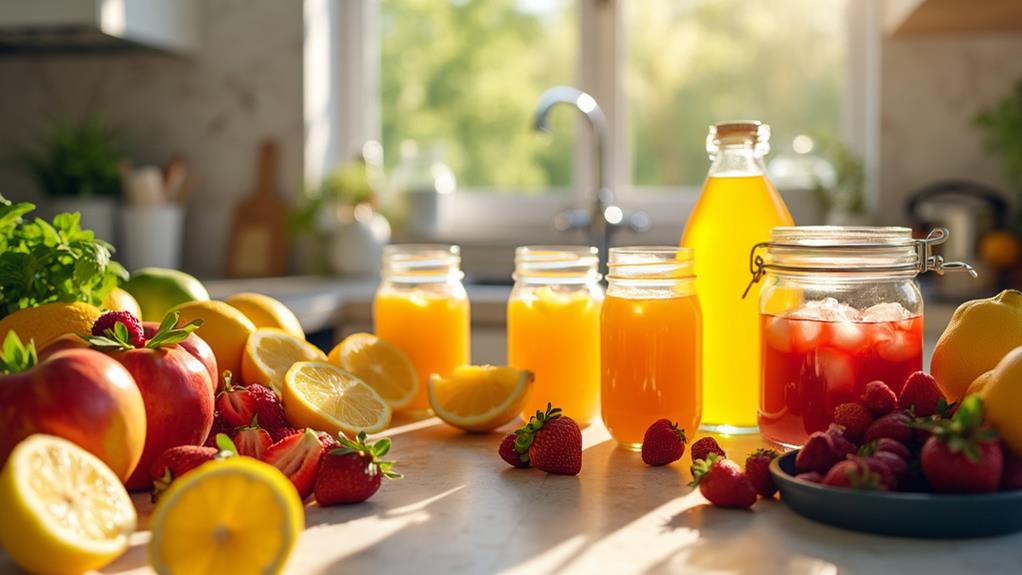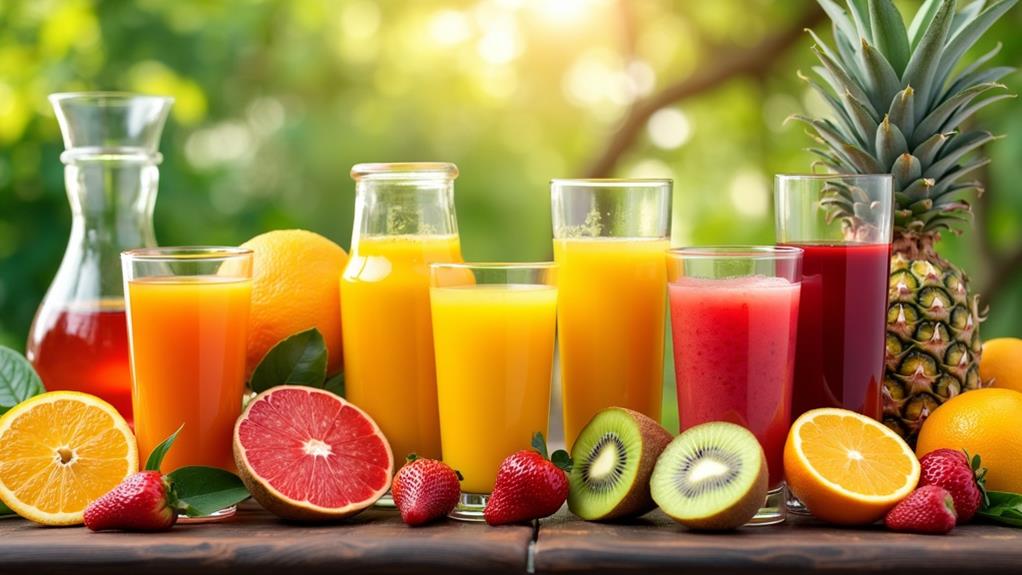Tips to Stop Juice From Spoiling
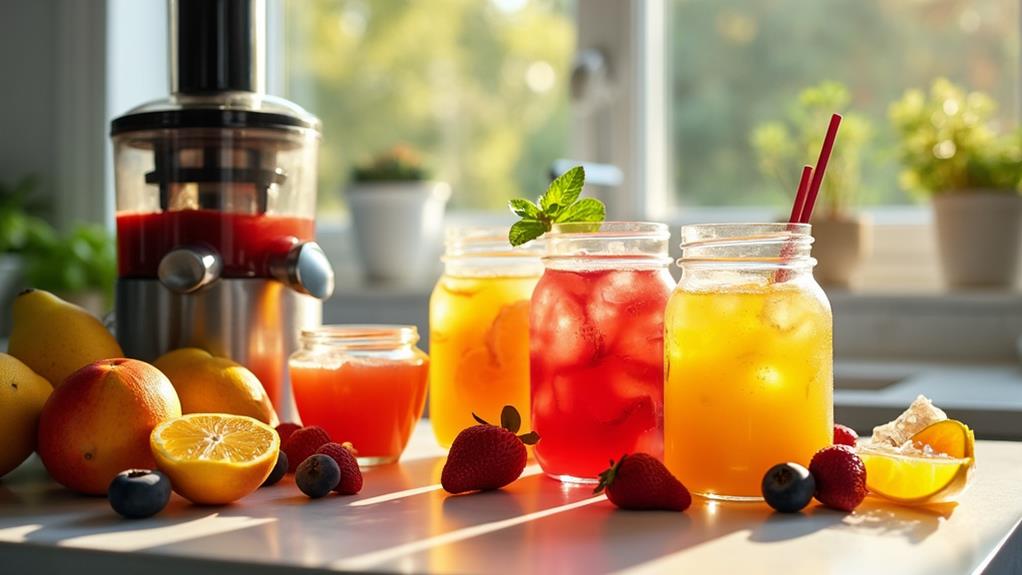
Ensuring your freshly made juice stays fresh and nutritious can be challenging, but practical steps can help reduce spoilage. Store juice in airtight glass containers and refrigerate it promptly to extend its shelf life. Adding natural preservatives like a splash of lemon juice can reduce oxidation and maintain flavor. Additionally, choosing the right juicer and understanding effective storage methods can further enhance your juice's freshness. What are the best ways to keep your juice from spoiling too quickly?
Juicing Benefits
Juicing offers a concentrated source of vitamins, minerals, and antioxidants, making it an efficient way to enhance your nutrient intake. The juicing process breaks down the cell walls of fruits and vegetables, enabling your body to absorb these nutrients more effectively. Adding homemade juice to your daily routine can help you meet the recommended servings of fruits and vegetables, thereby supporting a healthy diet and overall wellness.
A significant benefit of juicing is the ability to customize the nutritional content to meet your specific health needs. Whether you aim to boost your immune system, improve digestion, or increase energy levels, you can tailor your juice blends accordingly. Additionally, the variety of flavors and combinations you can create makes healthy eating more enjoyable and encourages a diverse intake of produce.
To maximize the benefits of your homemade juice, consider storage time and minimize oxygen exposure in your storage containers. Fresh juice is most nutritious when consumed immediately, but if storage is necessary, proper techniques can help preserve its quality and nutrient content. This ensures you continue to enjoy the full advantages of your nutritious juice.
Preventing Oxidation
Preventing oxidation is crucial to maintaining the freshness and nutritional value of your homemade juice. Once you make freshly squeezed juice, promptly transfer it into airtight glass containers. Fill them as close to the top as possible to minimize air exposure, a critical step in preventing oxidation.
Adding a splash of citrus juice, such as lemon or lime, not only boosts the Vitamin C content but also reduces oxidation in other fruits and vegetables. This simple trick can help preserve the vibrant color and taste of your juice.
Storing juice in the refrigerator immediately after preparation is another essential tactic. Cold temperatures slow down the oxidation process, aiding in nutrient retention. For an added measure, consider vacuum sealing your juice to remove air from the storage container, greatly extending the shelf life and further slowing down oxidation.
For optimal taste and nutritional benefits, consume your juice within 24-48 hours of juicing. This timeframe ensures maximum nutrient retention and minimizes the effects of oxidation on both taste and quality. By following these steps, your juice will remain fresh and nutritious longer.
Choosing the Right Juicer
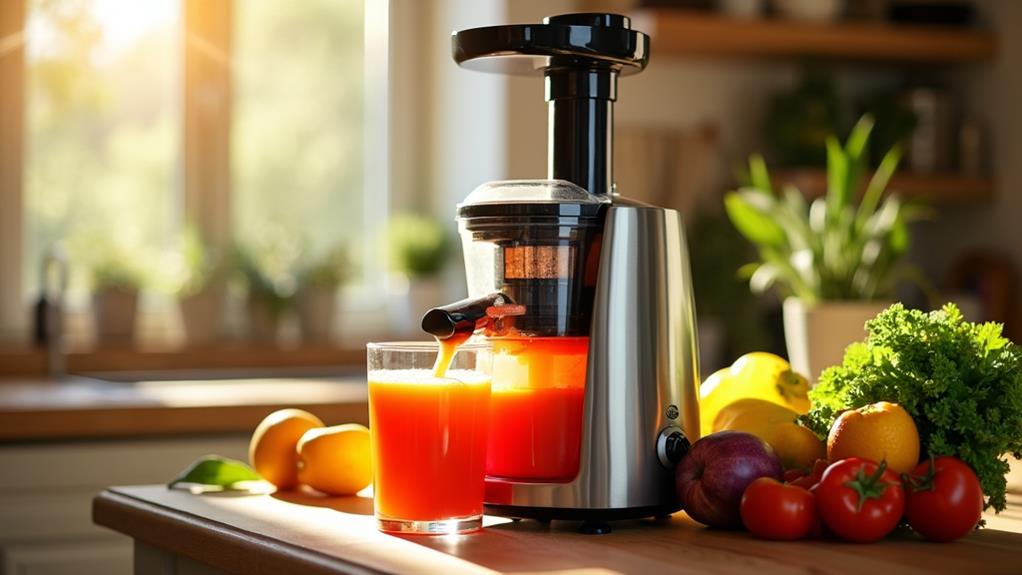
To keep your juice fresh, it is crucial to choose the right juicer. Masticating and twin gear juicers minimize oxidation and preserve nutrients more effectively than centrifugal juicers, which operate at higher speeds and lead to quicker nutrient degradation. By selecting a juicer that meets your specific needs, you can significantly extend the shelf life and maintain the quality of your juice.
Juicer Types Overview
Choosing the right juicer can significantly impact the quality and longevity of your juice. If your priority is nutrient retention and extended shelf life, masticating juicers are an excellent choice. Operating at lower RPMs, these juicers preserve more nutrients and keep your juice fresh for up to 72 hours by minimizing heat and oxidation.
Conversely, centrifugal juicers operate at high speeds, which can cause faster oxidation and a shorter shelf life, often requiring consumption within 24 hours. Although they are convenient and quick, centrifugal juicers may not be ideal for those prioritizing nutrient retention and prolonged freshness.
Cold press juicers, akin to masticating types, use hydraulic pressure to extract juice, minimizing heat and oxidation. This method results in better flavor and nutrient preservation. For optimal nutrient retention and longevity, twin gear triturating juicers are the best performers. Utilizing two gears for efficient juice extraction, they offer the highest nutrient retention and extend the juice's freshness.
Selecting the right juicer type directly influences juice quality, so make your choice based on your specific needs.
Impact on Freshness
One of the key factors in maintaining juice freshness is the type of juicer you use. Choosing the right juicer can significantly impact how long you can store fresh juice and preserve its quality. Masticating juicers, which operate at low RPM, excel in preserving up to 90% of the nutrients found in homemade juices. This method minimizes nutrient exposure to air, extending the freshness of your juice for up to 48 hours.
In contrast, centrifugal juicers, spinning at high speeds (3000-15000 RPM), cause more oxidation due to increased air exposure. This can degrade the juice quality and reduce its shelf life markedly, often spoiling after just 24 hours.
For optimal preservation, a twin gear triturating juicer is your best bet. It minimizes oxidation and optimizes extraction, keeping your juice fresh for up to 72 hours. The type of juicer you choose not only affects the shelf life but also the color and nutritional content of your juice. Cold-press or masticating juicers yield more vibrant and nutrient-rich juices, less prone to spoilage. Investing in a high-quality juicer, such as the Hurom H-AA 3rd Generation Alpha series, can improve flavor and freshness, making it easier to enjoy nutritious juices for longer.
Effective Storage Methods
To keep your juice fresh and extend its shelf life, it's crucial to use effective storage methods. Start by using airtight containers, such as glass bottles or mason jars. These containers minimize air exposure, reducing the risk of oxidation, which can spoil your juice. Filling these containers to the brim also helps limit the amount of air inside, further slowing down the oxidation process and extending the juice's shelf life.
Immediately after juicing, store your juice in the refrigerator to maintain freshness and slow down nutrient degradation. To further extend its longevity, consider adding a splash of citrus juice, such as lemon or lime. The antioxidants in citrus juice can reduce oxidation and preserve the juice's quality for a longer period.
Avoid plastic bottles for storage, as they can leach chemicals into your juice and degrade its quality. Instead, opt for glass bottles or stainless steel containers. These materials provide better protection against chemical leaching and help maintain the juice's integrity. By using these effective storage methods, you'll ensure your juice stays fresh and delicious for as long as possible.
Refrigeration Tips
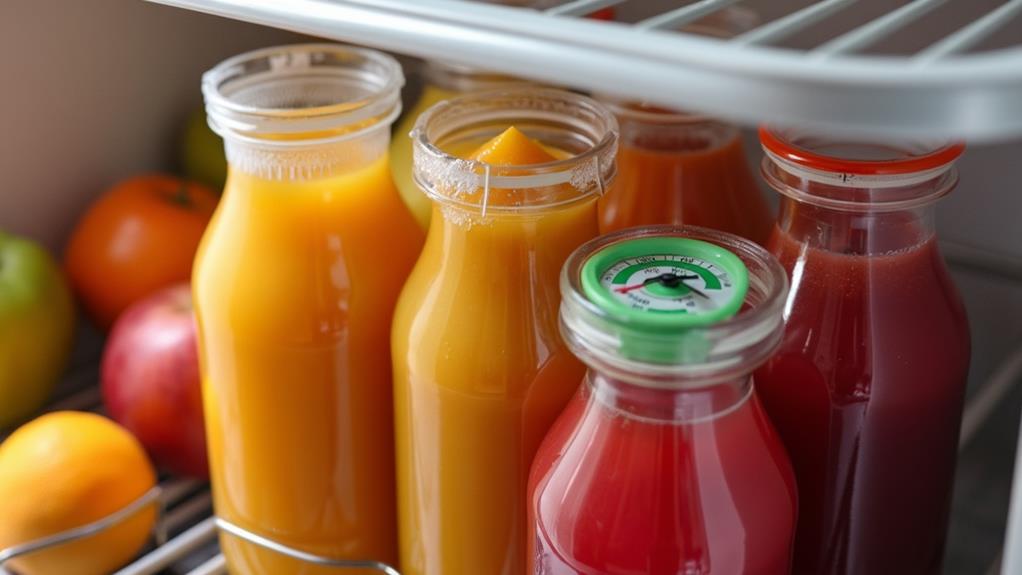
To maintain the freshness of your juice, refrigeration is essential. Always store your juice in airtight glass containers to minimize air exposure, which helps preserve its quality and nutrient content. Filling the containers to the brim further reduces air space, slowing down spoilage.
Set your refrigerator temperature below 40°F (4°C) to slow the degradation process. This temperature range is optimal for preserving the juice's quality and nutrients. While fresh juice can last 24-72 hours in the fridge, consuming it within 48 hours ensures maximum nutrient retention.
For extended shelf life, consider using BPA-free vacuum containers. These specialized containers eliminate air exposure even further and can significantly extend the juice's shelf life.
Regularly check your stored juice for any signs of spoilage, such as changes in color or smell. If you notice any signs of oxidation or degradation, discard the juice to ensure you are consuming only the freshest product. By following these refrigeration tips, you can enjoy your juice at its best quality every time.
Freezing Juice
Freezing juice is an effective method to extend its shelf life, often lasting up to 12-16 months. To start, use glass containers for storage. Glass is non-reactive, preserving the juice's flavor and nutrients, including vitamin C. Leave extra space in the containers to allow for the liquid's expansion during freezing, preventing cracks or spills.
Here's a quick guide to help you with the process:
| Step | Action | Tip |
|---|---|---|
| 1 | Choose glass containers | Non-reactive, preserves flavor |
| 2 | Leave extra space | Accommodates liquid expansion |
| 3 | Freeze citrus juices | High vitamin C content aids preservation |
| 4 | Label containers with the date | Helps track shelf life |
| 5 | Thaw frozen juice in the refrigerator | Maintains quality and taste |
Citrus juices like lemon and lime are particularly good for freezing due to their high vitamin C content and natural acidity. When ready to use, thaw the frozen juice in the refrigerator to maintain its quality and prevent rapid temperature changes that can affect taste. By following these steps, you can effectively extend the shelf life of your favorite juices.
Natural Preservatives
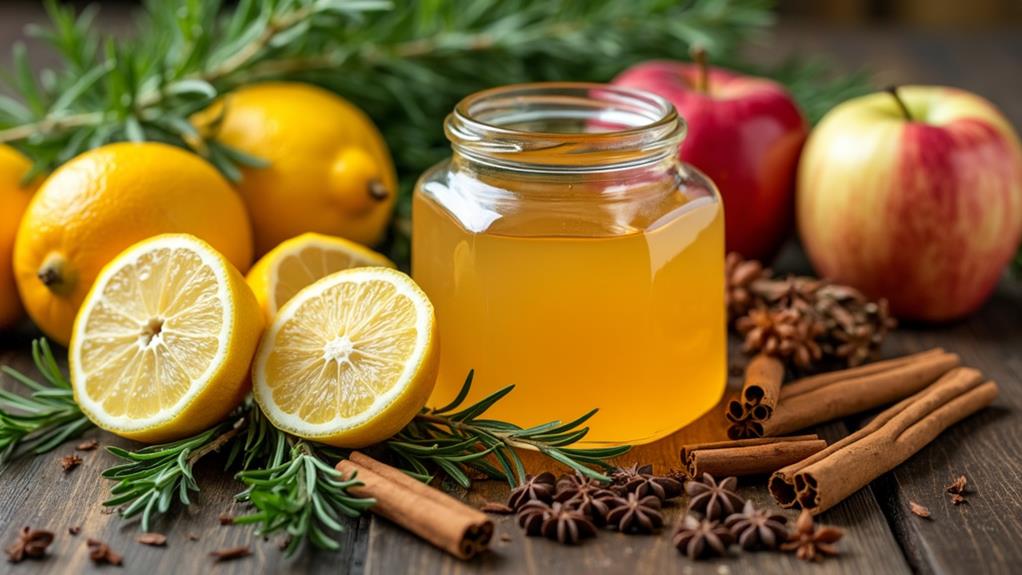
To keep your juice fresh, consider adding ascorbic acid, which prevents oxidation and maintains both color and flavor. Additionally, essential oils like rosemary or clove oil can extend your juice's shelf life due to their antimicrobial properties. These natural preservatives are effective and won't significantly alter the taste of your juice.
Ascorbic Acid Benefits
Leveraging the power of ascorbic acid, also known as vitamin C, can significantly enhance the freshness and flavor of juice. Ascorbic acid is highly effective in preventing oxidation, the main cause of juice spoilage. By adding about 0.5g of ascorbic acid to a 25cl bottle of juice, you can substantially extend its shelf life. This natural preservative works by reacting with oxygen to form compounds that do not cause browning or degradation.
For juices made from fruits prone to browning, such as apples and pears, incorporating ascorbic acid helps maintain their appeal and quality. By slowing down enzymatic reactions that lead to spoilage, ascorbic acid preserves the juice's freshness, taste, and nutritional content.
For juice entrepreneurs, consistently using ascorbic acid in your formulations can enhance product stability. By preventing oxidation and extending shelf life, you ensure that customers enjoy high-quality juice. Ascorbic acid is a reliable and natural way to keep your juices fresh and appealing.
Essential Oils Use
In conjunction with ascorbic acid, essential oils provide a natural and effective way to preserve your juice. Key oils such as rosemary, thyme, and oregano possess antimicrobial properties that inhibit the growth of bacteria and mold, significantly extending your juice's shelf life. Adding just a few drops of lemon essential oil not only enhances the flavor but also acts as a natural preservative due to its high citral content, which combats oxidation.
Here's why you should consider using essential oils in your juice:
- Rosemary, thyme, and oregano essential oils: Offer strong antimicrobial properties to inhibit bacteria and mold.
- Lemon essential oil: Enhances flavor and provides antioxidant effects.
- Clove essential oil: Effective against spoilage organisms without significantly altering taste.
- Grapefruit seed extract: Provides added protection against oxidation and microbial growth.
- Minimal usage: Only 1-2 drops per liter are needed to preserve juice without overpowering its flavor.
Using these essential oils can help keep your juice fresh and delicious for longer periods.
Monitoring Freshness
To ensure your juice remains fresh, regularly inspect its appearance and smell. Freshly made juice should have a vibrant color and a pleasant aroma. Any change in color or an unpleasant odor strongly indicates spoilage, and the juice should be discarded.
Juice loses about 80% of its nutritional value and appeal within 72 hours due to oxidation. To prolong its freshness, always store juice in airtight containers to minimize air exposure, which slows down oxidation and prevents spoilage.
Additionally, monitor the juice's consistency. Fresh juice should be smooth and uniform. Any changes in texture or separation of the liquid suggest the juice is no longer fresh and should not be consumed.
Keep track of how long the juice has been stored. Ideally, consume it within 24-48 hours. If it has been stored longer than the recommended time frame, it is safer to discard it to avoid health risks. Regularly checking these factors will help you enjoy fresh and nutritious juice every time.

